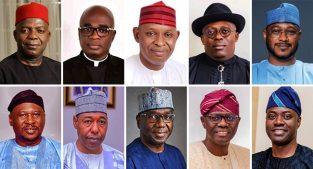By EDITOR
Sixteen state governors have purportedly recommended the establishment of state police to tackle the menace of insecurity damaging the country.
They also recommended changes to the constitution to allow for the creation of state police.
Briefing journalists shortly after 140th meeting of the National Economic Council (NEC) held virtually, the Minister said that the governors made their decisions in report submitted to the Council during the meeting chaired by Vice President, Kashim Shettima.
He said out of the 36 States, 20 State Governors and the FCT were yet to make their submissions.

The minister revealed that the 16 governors also called for the review of the 1999 Constitution as amended.
Meanwhile, NEC has also received the edited report of the ad-hoc committee on Crude Oil Theft Prevention and Control.
The committee identified the areas of oil leakages in the oil industry while observing cases of infractions.
The committee chaired by Governor of Imo State, Hope Uzodinma calls for political will to effect changes and reforms.
There has been clamour for state police as Nigeria grapples with worsening security challenges such as kidnapping and banditry.
The Peoples Democratic Party (PDP) had on February 12 reiterated their position on state policing.
The governors had maintained that state police is the solution to the country’s worsening security situation, lamenting that Nigeria is “almost on the road to Venezuela”.
Also, regional socio-political groups such as Afenifere, Ohanaeze Ndigbo, Middle Belt Forum, and the Northern Elders’ Forum, have repeatedly called for state police as a solution to the myriad of increasing security challenges confronting the nation.
Already, states in the South-West geopolitical zone have formed the Amotekun while their counterparts in the South-East also created a security outfit Ebube Agu. The Benue Guards has also been operational in Benue State in the North Central while states like Katsina, Zamfara, and other bandit-prone sub-nationals have also come up with similar state-established outfits.
However, these outfits have not been as effective as anticipated as they do not have the backing of the Federal Government. States continue to demand that Amotekun, Ebube Agu, and others be granted license to bear assault rifles like AK-47s to confront lethal gun-toting marauders.
Speaking exclusively on the issue, a presidency official who did not want to be named said, “The President told the state governors to discuss it further at the state level. A committee was set up for that. We have not heard from the committee yet. Don’t also forget that simultaneously, the national assembly is considering inserting state policing in the constitution. So, there is a consensus around state policing.
“As for the forest guards, work is going on with it. There are existing forest guards in several states, but they are under the states’ ministries of agriculture. The goal now is to strengthen their capacity by arming them properly and recruiting more people.
“Still, it all falls in the hands of states to strengthen the forest guards. That is where we are now.”
Another Presidency official who spoke on condition of anonymity said the opening of the Nigeria-Niger border was part of efforts to stall the proliferation of the small arms and light weapons non-state actors use for their enterprise.
“What I know is this: some people have linked our security problems to the situation in Libya. The Libya conflict has led to the flow of arms to Nigeria. We share a long border with Niger. And many arms are flowing into the country.
“Our borders with our Sahelian neighbours are largely ungoverned. So, there are many arms in the hands of this bandit.
“We had to make peace with Niger because of this. It was an attempt to appease Niger. We share the same border. If we are not at peace with them, they may ignore the arms flowing in. Even the food shortage we are talking about, many goods come from Niger to Nigeria. We exacerbated things when we shut the border,” the official said.
In a similar development, the Nigeria Governors’ Forum, in a communique its issued at the conclusion of its virtual meeting, and signed by its Chairman, Kwara State Governor AbdulRahman AbdulRasaq, dated Wednesday and made available to the press on Thursday, emphasised the importance of incorporating State policing as a crucial amendment in the ongoing 1999 Constitutional Amendment process to address a fundamental flaw in the national security framework.
The communique read in part, “The Forum commiserated with the Governor of Delta State, H.E Sheriff Oborevwori, over the communal clash between Okuama in the Ughelli South Local Government Area and Okolaba in the Bomadi Local Government Area of Delta State, and which led to the death of many including 16 military personnel. While condemning the heinous act, members observed a minute of silence for the souls of the departed.
“Members reviewed the progress of the National Minimum Wage Committee and ongoing multi- stakeholder engagements towards agreeing on a fair minimum wage.
“Members urged the NMWC to consider the current realities, individual State peculiarities and consequential impact on the capacity of the government as well as private sector employers to pay. Members also emphasized the need for proposals to be data- driven and evidence-based.
“The Forum highlighted the need for State policing as a critical amendment in the ongoing 1999 Constitutional Amendment proceedings to correct a fundamental flaw in the national security architecture.”
